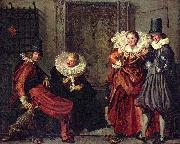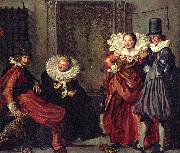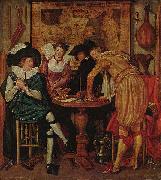Willem Pieterszoon Buytewech Olja Måleriet ReproduceringAll Willem Pieterszoon Buytewech Oil Paintings(1591/1592, Rotterdam - September 23, 1624, Rotterdam) was a Dutch painter, draughtsman and etcher of the Golden Age. He is often considered the "inventor" of Dutch genre painting. For his preference of irony, his contemporaries named him Gheestige Willem (Jolly or spiritual William). Buytewech was the son of Pieter Jacobsz, a cobbler and candlemaker. He learned his trade in Haarlem, where he became a member of the artists' guild (Haarlem Guild of St. Luke) in 1612, together with Hercules Segers and Esaias van de Velde.[1] Frans Hals, who was a member of this guild since 1610, had much influence on Buytenwech's work, as shown by the many drawings that the latter made after Hals's paintings. After his marriage on November 10, 1613 with Aeltje van Amerongen, of a patrician family, he returned to Rotterdam. There Hendrik Martenszoon Sorgh was one of his pupils. Buytewech was primarily a graphic artist, mostly of landscapes and genre pieces, but occasionally also of biblical and allegorical themes. Of his paintings only eight have survived to this date, all genre pieces, most depicting merry companies. Willem Buytewech's Merry CompanyHe died at the age of only 32 or 33 of unrecorded causes. His son Willem Willemsz Buytewech (1625-1670), born after his death, would become a painter as well. |
|||

|
|||
|
|
|||
|
||||||||
| Willem Pieterszoon Buytewech (1591/1592, Rotterdam - September 23, 1624, Rotterdam) was a Dutch painter, draughtsman and etcher of the Golden Age. He is often considered the "inventor" of Dutch genre painting. For his preference of irony, his contemporaries named him Gheestige Willem (Jolly or spiritual William). Buytewech was the son of Pieter Jacobsz, a cobbler and candlemaker. He learned his trade in Haarlem, where he became a member of the artists' guild (Haarlem Guild of St. Luke) in 1612, together with Hercules Segers and Esaias van de Velde.[1] Frans Hals, who was a member of this guild since 1610, had much influence on Buytenwech's work, as shown by the many drawings that the latter made after Hals's paintings. After his marriage on November 10, 1613 with Aeltje van Amerongen, of a patrician family, he returned to Rotterdam. There Hendrik Martenszoon Sorgh was one of his pupils. Buytewech was primarily a graphic artist, mostly of landscapes and genre pieces, but occasionally also of biblical and allegorical themes. Of his paintings only eight have survived to this date, all genre pieces, most depicting merry companies. Willem Buytewech's Merry CompanyHe died at the age of only 32 or 33 of unrecorded causes. His son Willem Willemsz Buytewech (1625-1670), born after his death, would become a painter as well. |
||||||||
|
|
||||||||
| Måleriet Identifieringen :: 72034 Heet voor te stellen: 2 zusters uit het geslacht Duvelandt van Rhoon en de heren Dirc van der Nath en Johan van Heet voor te stellen: 2 zusters uit het geslacht Duvelandt van Rhoon en de heren Dirc van der Nath en Johan van |
||||||||
|
|
||||||||
| Måleriet Identifieringen :: 73533 Dignified couples courting Date ca. 1616-1620 (1606-1624) Medium Oil on canvas Dimensions 56.3 X 70.5 cm (22.17 X 27.76 in) cyf |
||||||||
|
|
||||||||
| Måleriet Identifieringen :: 89457 Frohliche Gesellschaft c. 1615(1615) Medium oil on canvas Dimensions 72,6 x 65,4 cm cjr |
||||||||
|
|
||||||||
|
| FÖREGÅENDE KONSTNÄR Nästa Konstnär | |||||||
|
|
||||||||
|
Willem Pieterszoon Buytewech (1591/1592, Rotterdam - September 23, 1624, Rotterdam) was a Dutch painter, draughtsman and etcher of the Golden Age. He is often considered the "inventor" of Dutch genre painting. For his preference of irony, his contemporaries named him Gheestige Willem (Jolly or spiritual William). Buytewech was the son of Pieter Jacobsz, a cobbler and candlemaker. He learned his trade in Haarlem, where he became a member of the artists' guild (Haarlem Guild of St. Luke) in 1612, together with Hercules Segers and Esaias van de Velde.[1] Frans Hals, who was a member of this guild since 1610, had much influence on Buytenwech's work, as shown by the many drawings that the latter made after Hals's paintings. After his marriage on November 10, 1613 with Aeltje van Amerongen, of a patrician family, he returned to Rotterdam. There Hendrik Martenszoon Sorgh was one of his pupils. Buytewech was primarily a graphic artist, mostly of landscapes and genre pieces, but occasionally also of biblical and allegorical themes. Of his paintings only eight have survived to this date, all genre pieces, most depicting merry companies. Willem Buytewech's Merry CompanyHe died at the age of only 32 or 33 of unrecorded causes. His son Willem Willemsz Buytewech (1625-1670), born after his death, would become a painter as well. |
||||||||
|
|
||||||||
|
KOMMA I KONTAKT MED Oss |








